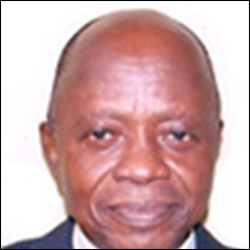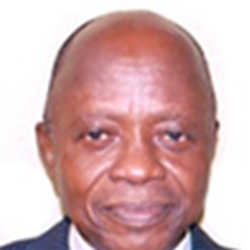 Sims Recycling Solutions provides a featured interview of a customer, partner or colleague within the field of IT asset disposition or recycling. These interviews provide an opportunity to learn about the different aspects of electronic equipment disposal or recycling from an economic, environmental or social perspective. This issue profiles Oladele Osibanjo, director of the Nigerian Basel Convention Coordinating Centre for the Africa Region (BCCC-Africa); Co-Chair of the Basel Partnership for Action on Computing Equipment (PACE); and professor of Analytic/Environmental Chemistry at the University of Ibadan in Nigeria.
Sims Recycling Solutions provides a featured interview of a customer, partner or colleague within the field of IT asset disposition or recycling. These interviews provide an opportunity to learn about the different aspects of electronic equipment disposal or recycling from an economic, environmental or social perspective. This issue profiles Oladele Osibanjo, director of the Nigerian Basel Convention Coordinating Centre for the Africa Region (BCCC-Africa); Co-Chair of the Basel Partnership for Action on Computing Equipment (PACE); and professor of Analytic/Environmental Chemistry at the University of Ibadan in Nigeria.
When did you begin working on hazardous waste issues and what is your background?
I started working on hazardous waste issues in 1988 when about 4,000 metric tons or more than 8.8 million pounds of assorted hazardous wastes from a European country were illegally dumped at the Koko Port in Nigeria. The federal government of Nigeria invited me to join the international team of experts from the United States, United Kingdom and Japan that worked on the identification of the wastes.
What is the mission of the Nigeria-based Basel Convention Coordinating Centre for the African Region (BCCC-Africa) and how does it operate within the region? What are its biggest accomplishments to date?
The mission of BCCC-Africa includes strengthening the framework for Environmentally Sound Management (ESM) of hazardous and other wastes within the Africa region; an essential contribution to the attainment of meeting United Nations Millennium Development Goals, a sustainable livelihood, and the protection of human health and the environment. The BCCC-Africa operates through cooperation and partnership with the Basel Convention Regional Centres (BCRCs) in Egypt, Senegal and South Africa to organize capacity building workshops to promote implementation of the Basel Convention and implement projects of regional importance. We also partner in joint activities with other regional organizations such as the African Union Commission in Addis Ababa, Ethiopia and the Economic Community of West African States.
Our big accomplishments to date include
- the successful organization of the Secretariat of Basel Convention (SBC) E-waste Africa Project from 2009–2012 involving seven African countries (Benin, Cote d’lvoire, Egypt, Ghana, Liberia, Nigeria, Tunisia);
- Representing the African region at the Strategic Approach to International Chemicals Management International Conference on Chemicals Management in Geneva in May 2009, where hazardous substances within the life cycle of electrical and electronic products (HSLEEP) were adopted as an emerging policy issue;
- Successfully chairing the Steering Committee for the planning and organization of the First Pan Africa E-waste Forum in Nairobi in March 2012; and
- Most recently, successfully organizing a regional workshop attended by OEMs, non-government organizations, the informal sector, etc. on enhancing capacities for the ESM of waste electrical and electronic equipment (WEEE) through regional delivery in Africa (32 countries) in Lagos, Nigeria this past October.
After successfully completing most of its mandate, the Basel PACE is looking toward a future of more “on-the-ground” work in the regions led by the BCRCs. How do you see PACE evolving and what do you see as the private sector’s role in advancing its work in tackling e-waste issues?
I foresee the new PACE strengthening the use of the guidelines and reports they have developed with concrete activities, practical on-the-ground actions and initiatives such as pilot/demonstration projects looking at the life cycle approach and ESM of used and waste electrical and electronic equipment at the regional and national levels. It is envisaged that the BCRCs/BCCCs will play a greater role in these activities as well as exercising some governance coordinating functions globally in synergy with the Basel, Rotterdam and Stockholm Convention Secretariat without duplication of functions.
Major roles by industry would include implementation of Extended Producer Responsibility (EPR) in developing and economy-in-transition countries. Industry also has a major role to play in upstream activities such as designing out hazardous substances or replacing hazardous substances with less harmful alternatives or substitutes in electronic products. The new PACE could extend the experiences already gained vertically to consumer electronics in category four of the European Union WEEE category and/or other e-waste categories based on global concern and/or emerging policy issues. Issues of ESM of waste are embedded in most of the new United Nations Sustainable Development Goals underscoring the need for further active participation by industry in new Basel PACE.
You wear several professional hats? How does this shape your work?
Yes, I wear several professional hats including President of the Waste Management Society of Nigeria which is a national member of the International Solid Waste Association; Environmental Consultancy to government and industry in Nigeria; full-time lecturing of graduate students in Analytical Chemistry, and Environmental Chemistry and Pollution Control; and supervision of projects of graduate and doctoral students assigned to me in the Department of Chemistry at the University of Ibadan, Nigeria. There is good synergy within the various academic and professional activities I am engaged in. The integrated experiences shape and make my work interesting.
What do you like to do in your spare time?
My hobbies include listening to music of all sorts from around the world, depending on my mood. As a top sports enthusiast I love to watch English Premier League soccer matches as well as Spanish La Liga matches on pay television most weekends, as well as lawn tennis and boxing. I also love to read general books on nature and walk around in my home garden as exercise.
